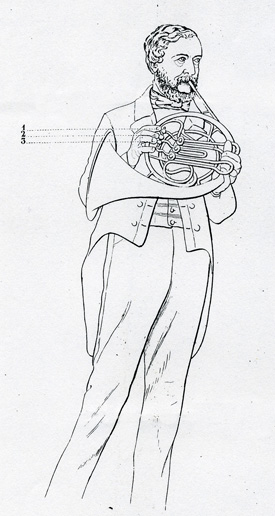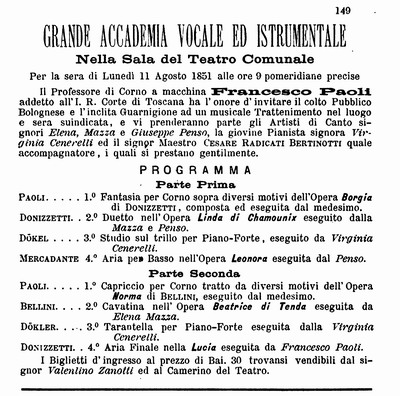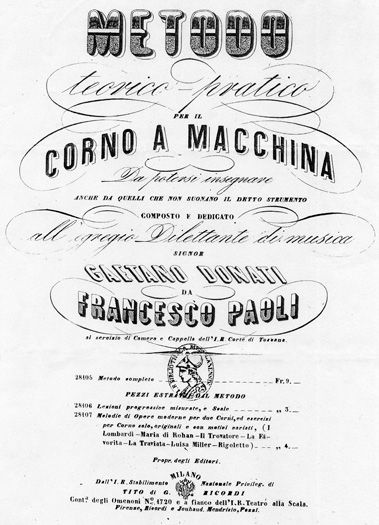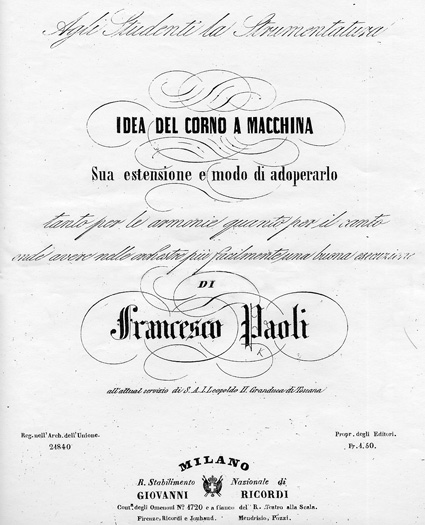Francesco
Paoli (1820-1870) was a horn player,
composer, and professor of horn at the Istituto
Musicale di Firenze and court musician in service of
His Imperial and Royal Highness Leopold II
(1797-1870), Grand Duke of Tuscany. Francesco Paoli
was born in Pescia (Tuscany) April 18, 1820. He
started as an occasional player in the chamber music
and orchestra of the grand-ducal court of Tuscany, and
succeeded Antonio
Tosoroni as the court's principal horn on
February 15, 1846. He and Tosoroni were accademici
professori at the Imperiale e Reale Accademia
delle belle arti di Firenze. Leopold was deposed in
1859 and removed to Bologna, leaving Sig. Paoli
unemployed for a short time. When the Music Institute
of Florence was founded by decree of Victor Emmanuel
II on March 15, 1860 he was immediately appointed
maestro of brass instruments.
Sig. Paoli performed as principal horn at il Teatro
in via della Pergola `(founded 1652) including
the premiere of Verdi’s Macbeth., March 14, 1847. On
August 11, 1851 he performed three of his own works
for Corno a Macchina on a concert at the
Grande Accademia Vocale ed Istrumentale, Bologna:
“Fantasia per Corno sopra diversi motivi dell’Opera
Borgia di Donizzetti”, “Capriccio per Corno tratto da
diversi motivi dell’Opera Norma di Bellini”, and “Aria
Finale nella Lucia di Donizzetti.” A few years
prior to his death he retired as first horn from the
orchestra of the Pergola Theatre to concentrate his
activities in the trade of musical instruments in
Florence where he founded a well-appointed and highly
esteemed store.
Francesco Paoli died in Florence of cardiac disease on
January 15, 1870 leaving a considerable legacy of
methods for the study of brass instruments. He was a
teacher of brass instruments of the highest ability,
as is proved by his many talented private and public
students. He was succeeded at the Istituto Musicale di
Firenze, by his pupil Luigi Viviani.1
|

Illustration from
Paoli's Metodo teorico-pratico per il corno a
macchina da potersi insegnare anche a quelli che non
suonano il detto strumento, [1855]. The
unusual horn he is holding is typical of those found
in bands in
northern Italy, made by the firms of Ferdinando
Roth, Giuseppe Pelitti, Daniel
Meinl and others.
|
Extant works for horn:
Idea del Corno a Maccihina, monografia, Milano:
Ricordi (n.d.)
16 Studi per Corno a Macchina, Firenze : Ferd.
Lorenzi
Metodo teorico-pratico per il corno a macchina da
potersi insegnare anche a quelli che non suonano il
detto strumento, [1855],
“Fantasia per corno a macchina con accomp. di pianoforte
tratta dall'opera Il Pirata di V. Bellini”, [1857]
“Capriccio per corno a macchina con accomp. di
pianoforte tratto da diversi motivi dell'opera
Norma”, [1857]
“Divertimento per corno a macchina con
accompagnamento di pianoforte tratto dall'opera”
Beatrice di Tenda, 1858
“Fantasia per corno a macchina con accomp.to di
pianoforte sopra motivi dell'opera La Traviata di
Verdi”, 1858
“Fantasia per corno a macchina con accomp.to di
pianoforte sopra vari motivi dell'opera Lucrezia Borgia
di Donizetti,
“Romanza per canto e corno a macchina con acc.to di
piano-forte”, Firenze : G. Passerai,
Works for other instruments:
“I Verdiani : canzone nel Rigoletto per cornetta o
tromba
Metodo progressivo per oficleide o bombardone,
[circa 1866]
“Marcia trionfale per pianoforte”
|

Cronologia di tutti gli
spettacoli rappresentati nel gran Teatro
Comunale di Bologna, p. 149
|
Left, notice of a concert
by the Grand Vocal and Instrumental Academy in
the Community Theater of Bologna, August 11,
1851:
"The professor of valved horn
Francesco Paoli assigned to his majesty's .
Court of Tuscany has the honor to invite the
learned Bolognese Public and illustrious
garrison to a musical evening and
entertainment in the aforementioned place,
and will take part with the vocal artists Elena
Mazza and Giuseppe Penso, and
the young lady pianist Virginia
Cenerelli and Signor Maestro Cesare
Radicati Bertinotti as accompanist, who lend
themselves nicely."
Below, title pages from Paoli's Metodo (1855)
and Idea del Corno a Machina (n.d.).
In the latter, Sr. Paoli suggests that valved
horns in F be equipped with pezzi di
cambio (tuning slide crooks) in the keys
of Sol, Fa, Mi, and Mib for the purpose of
playing in these and other keys more
satisfactorily.
|

Theoretical and practical method
for the valved horn that can teach even those
who do not play on that instrument,
composed and dedicated to the distinguished
amateur musician Mr. Gaetano Donati by
Francesco Paoli at the service of the House
and Chapel of the His Majesty's Court of
Tuscany
.
|

To the Students of the
instrument [an] Idea for the valved
horn its compass and method of playing it as
much for harmony as for singing in order to
more easily have a good performance in the
orchestra, by Francesco Paoli presently in
the service of His Imperial and Royal
Highness Leopold II, Archduke of Tuscany
|
|



